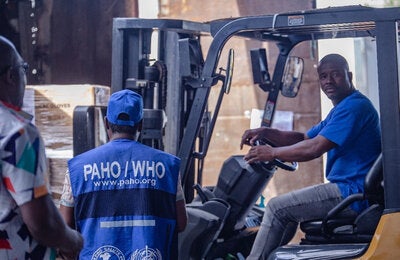
CLP/WR and WHO trained professionals from the region
Montevideo, 25 July 2023. Professionals from the region participated in training on Maternal and Perinatal Mortality Surveillance and Response (MPDSR), a system based on the surveillance of all maternal and perinatal deaths, in order to understand the factors that contribute to guide actions to prevent future deaths.
The workshop was organised by the Latin American Centre for Perinatology (CLP/WR) of the Pan American Health Organization (PAHO/WHO), in coordination with MCGL-Momentum and the World Health Organization (WHO), from 17 to 20 July in Panama City.
Through this activity, suggestions were gathered for the adaptation of the different modules that make up the face-to-face course for the region and training was given to professionals who will be responsible for replicating the knowledge in their territories.
The regional advisor on Perinatal Health of CLP/WR, Pablo Durán, referred to the relevance of this workshop and expressed that "it is of utmost importance because maternal and perinatal deaths are a critical problem in the region and it is necessary to move forward to reduce them. The result of this workshop will be to have a group of trained professionals to replicate this same methodology in the countries of the region and thus strengthen the response.
Bremen De Mucio, regional advisor on maternal health at CLP/WR, explained that the workshop was originally produced by WHO together with Jhpiego and the Momentum consortium. "It was first designed in English and tested in one country in Asia and one country in Africa. The package we are working on needs regional and probably local adaptations. The participants have contributed to making those adaptations that we need for the region, particularly for Spanish-speaking countries with a different culture than the two countries where it was tested".
De Mucio said that while there is more experience in maternal mortality surveillance in the region, there is still a long way to go in terms of perinatal mortality surveillance and the two components need to be studied and addressed in an integrated manner.
Francesca Palestra, Maternal Health Advisor at WHO, said: "This is one of the first face-to-face courses we are doing on maternal and perinatal mortality surveillance and response. It is fundamental because every country needs to have a surveillance system that can provide adequate data to monitor the numbers of maternal, neonatal and stillbirth deaths. Palestra also said, "The participants will take away a complete orientation of what the contents are, how to approach the subject and organise the surveillance system in their countries at the three levels (national, sub-national and hospital).
From now on, follow-up will be carried out with the newly trained facilitators, and support will be provided so that the countries can develop specific plans in their countries.
In this regard, the PAHO/WHO Panama advisor, Itzel Thomas, said she was very pleased with the workshop in Panama and said that the next steps for the country are "having a team of facilitators in place, analysing a training programme at both subnational and national levels to strengthen this component of surveillance and to focus not only on maternal death but also on perinatal death".
In addition, the advisor considered that "the workshop had an innovative methodology that included several techniques to promote the consolidation of knowledge".
This action was supported by Global Affairs Canada, through the project "Improving the Situation of Women and Adolescents in Vulnerable Situations".




